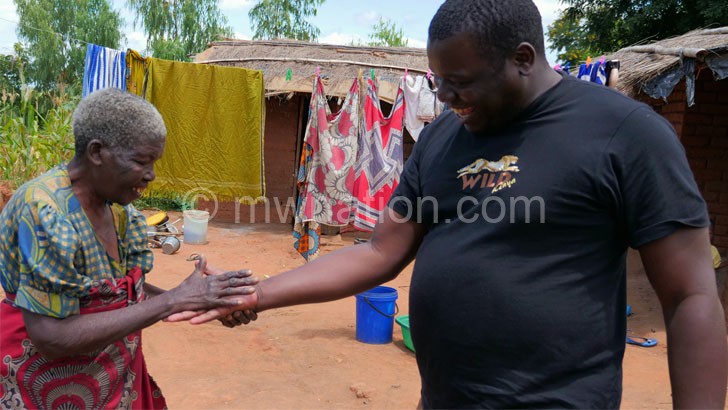Goodbye hand-shaking?
Novel foot-shakes. Hi-fives. Elbow bumps. Fist-to-fist Rastafarian greeting. A minister refusing to shake a prime minister’s hand. Lovers swapping hugs for flying kisses, sheer shout-outs, waves and quick pats on the backs.
People alarmed by the fast-spreading coronavirus are saying hello in bizarre ways, but is it time to wave goodbye to handshaking?
“It’s rude to refuse the time-honoured handshake. Love is in the hands,” says Katrina Fredi, an octogenarian we met in Masilimale Village on the outskirts of Ntcheu town.
Among 17.6 Malawians, handshakes exude greater warmth than words—and it takes time.

Grab a hand extended your way, you will instantly feel the warmth. Then you will be gripped for a while, as the one greeting you looks straight into your eyes: Muli bwanji? Now, stay there for a joke or two, you will be laughing heartily as the spacing wanes and unseen droplets seep into the air with every chuckle.
And try doing that everywhere you go. Now, don’t forget to ask yourself when did each one of you last wash your hands with soap after sneezing, coughing, laying a hand on frequently touched surfaces or shaking hands with someone with little or no regard for hand hygiene?
The worldwide coronavirus outbreak from Wuhan City in China has put the lengthy handshake on trial. But many Malawians aren’t buying informal alternatives to the much-loved greeting that transmits the virus unless everyone washes hands with soap regularly.
Just a tenth of the population washes hands with soap though the majority know the benefits of doing so, Ministry of Health reports.
“Stop saying love is in the hands, just say hello or try safer alternatives,” warned Vice-President Saulos Chilima at a rally in Blantyre on Sunday. “If coronavirus gets into the country, it will affect everything, including political gatherings and forthcoming presidential polls.”
The pandemic, with 66 000 confirmed deaths, has disrupted travel, business, industries social events and livelihoods globally.
Professor Adamson Muula, an epidemiologist from the University of Malawi’s College of Medicine, says there are a lot of basic preventive measures to learn before the novel virus reaches Malawi.
He explains: “The speed of spread of any other infectious disease varies according to many factors. Direct contact between people is one of the way scoronavirus is transmitted.
“So, for sure, close contact, handshakes, kissing and being close to people who are coughing or sneezing will spread the virus,” he says.
The virus just next-door in Tanzania spreads through contact with droplets secreted when coughing, sneezing or speaking.
Some catch it by touching surfaces where it lands. Frequently touched surfaces include tables, desks, benchtops, light switches, phones, keyboards, toilets and guardrails.
Muula urges everyone to pay more attention to neglected hand hygiene.
“We can learn several things. The first is that simple preventive tools such as handwashing can go a long way,” he explains.
Health authorities consider washing hands with soap a cheap but effective form of infection control. The Ministry of Health projects that basic hygiene and sanitation could halve queues of outpatients in public health facilities.
Coronavirus enters the body via the mouth, nose or eyes, but science shows one can shed it by washing hands with soap thoroughly and long enough to sing ‘Happy Birthday’ twice.
The virus is enveloped in a fatty outer layer which easily falls apart on contact with soap, according to an infection control expert.
“The idea of hand washing is not to kill the germs, but to remove them from your hand. Soap and water will definitely remove the virus from your hands if you lather up,” Mary-Louise MacLaws, from the University of New South Wales, advises.
However, Malawians who wash hands with soap as a life-saving habit are six times fewer than mobile phones in use.
Due to low income and awareness, many spend their money on food and other basic needs, not soap.
And 10 shopkeepers and shop owners in Lunzu Township, Blantyre, said the same thing: All customers demand soap for bathing and laundry, not handwashing.
But water, sanitation and hygiene experts say all soaps—even the razorblade-thin residues—wipe out germs in hand.
Dr Charles Mwansambo, chief director of health, terms handwashing the first line of defence against the highly contagious virus.
“You can catch coronavirus if you rub your eyes, mouth and nose after touching or shaking hands with an infected person,” he warns.
Coronavirus has affected about 168 000 people in 150 countries and territories, including 26 Africa.





